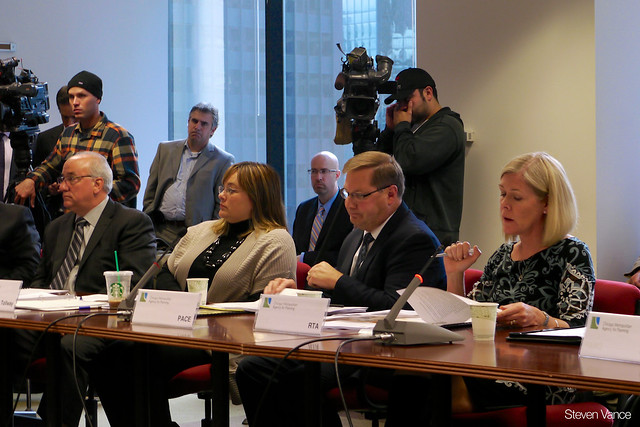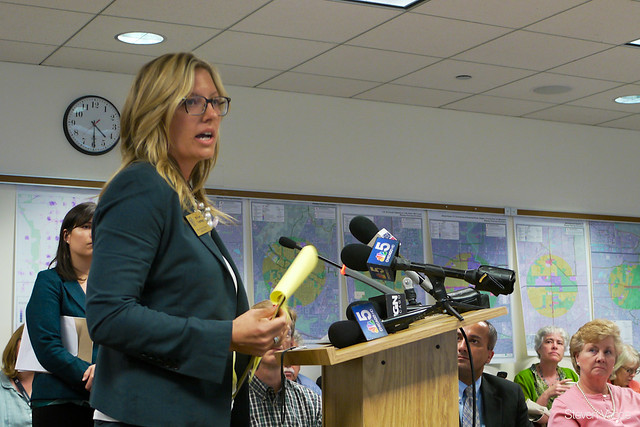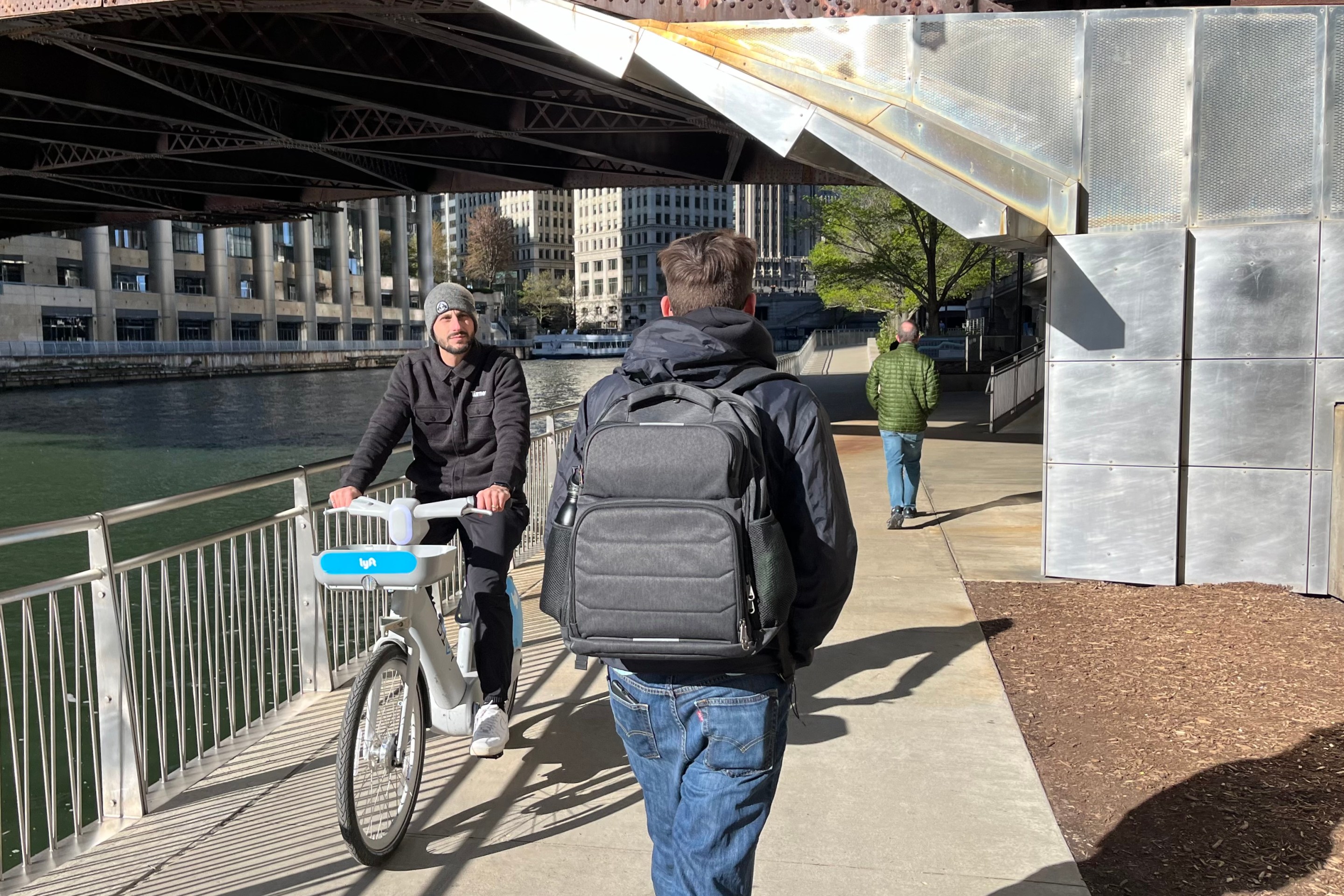Metra and Pace Maintain Support for Illiana at the Expense of Transit
3:47 PM CDT on October 18, 2013
Yesterday, 11 members of the Metropolitan Planning Organization policy committee, including Metra and Pace, voted to add the Illiana Tollway to the GO TO 2040 regional plan. This enables the Illinois DOT and Indiana DOT to move forward with the project approvals necessary to receive federal funds.
It also sets the stage for huge sums to be siphoned from GO TO 2040's existing transportation project list -- including transit investments -- which is supposed to focus future growth in existing communities. In a scathing response, the Active Transportation Alliance today singled out Metra and Pace for voting against the interests of transit riders.
At the meeting, when it was time to talk about the Illiana, IDOT Secretary Ann Schneider joked to the overflow crowd, "Now we're on the least controversial agenda item." She pointed to a stack of the letters from BNSF (owner of an intermodal yard near the proposed tollway) and the many state representatives and senators who wrote in after the public comment period. No one had time to actually review the letters before casting their vote.
Randy Blankenhorn, executive director of the Chicago Metropolitan Agency for Planning, which oversees the GO TO 2040 regional plan, reiterated why CMAP staff recommended against funding the project. In addition to pointing out how the Illiana is at odds with GO TO 2040, Blankenhorn emphasized that IDOT overstated the share of intermodal truck and railroad traffic in Will County -- where the highway would cut through -- compared to other places in the region, and that IDOT is forecasting greater population growth in Will County than GO TO 2040 forecasts.
IDOT justifies the highway by saying it would serve a growing population and truck traffic, but basing new highway construction on such forecasts becomes a self-fulfilling prophecy: The road itself attracts more population and freight movement. IDOT is in denial about this. In a document prepared for the Illiana environmental review process [PDF], IDOT claims that "land-use planning is not the role of IDOT/INDOT" and that "IDOT/INDOT is not driving land use." While these statements were mostly intended to say that IDOT would not be doing land-use planning on behalf on the communities affected by the Illiana Tollway, IDOT is unequivocally involved in land-use planning, because any transportation project as big as the Illiana is bound to have a major impact on the surrounding area.
As Gary Toth of Project for Public Spaces writes, "some of the most egregious land use issues, both in America and in the world at large, stem from the misguided investment in transportation systems that prioritize high speed mobility. What inevitably follows is spread out development dependent on the automobile for access to critical needs." By denying this link, IDOT diverges completely from CMAP's goals. IDOT wants to build on farmland in rural Illinois, while GO TO 2040 says development should occur in existing communities.
Now that IDOT has the MPO policy committee's approval, the agency can move forward with writing the final environmental impact statement and finish preparing a finance package. In response to criticism that the agency hasn't given enough details about the financial risk, Schneider said, "we're holding our cards close to our vest" and that they agency has "good ideas" on how to shorten the number of years that taxpayers would be on the hook to subsidize operations and maintenance.
Once the finance package is set, companies will respond with their bids. IDOT project manager Pete Harmet indicated that 15 "teams" have expressed their interest in the project.
To allow IDOT to enter into a public-private partnership (PPP) like this, an enabling law was passed in 2011. The Illinois legislature still has to approve any PPP project before a request for proposals is issued. The Metropolitan Planning Council, which advocated for the PPP law but against the inclusion of the Illiana into GO TO 2040, mentioned in 2011 another aspect of the law: "All projects considered for PPPs must be consistent with the corresponding region’s plan, provided the region has a Metropolitan Planning Organization."
We all know how that worked out: CMAP said it was not consistent.
Before the vote yesterday, Active Transportation Alliance director Ron Burke called out Metra and Pace for supporting the Illiana at the CMAP transportation committee meeting earlier in October, exclaiming, "You have a choice: dilute and divert [transportation dollars] and support a project that has a lot of disagreement... or you focus these limited dollars on projects you actually agree on, projects in GO TO 2040. This vote may come down to Metra, Pace, and the Regional Transportation Authority. Stand up for your riders." RTA voted against including the Illiana. Metra and Pace did not.
Pace explained its position at the meeting, and it still goes against their mission of providing bus service to suburban residents. Richard Kwasneski represents the agency on the committee and is a Pace board member, but he also heads the Joliet Arsenal Development Authority, a state agency that promotes the development around the former Joliet arsenal, a state-owned property adjacent to the proposed Illiana Tollway. He said that the region needs to show private investors it's serious about attracting their investment. "I think if we send the wrong message out there we're not going to get the investments necessary," he said, adding "I still believe these other projects are important."
I am still perplexed by Metra's vote to support the plan. In a statement today, Active Trans said that Metra is "run by politics" and that if Metra and Pace had stood up for their riders, the motion to include Illiana would have failed. "The Illiana Expressway is a train wreck for transit, and Metra and Pace voted for it anyway," it said.
Stay in touch
Sign up for our free newsletter
More from Streetsblog Chicago
Johnson appoints one West Side pastor for CTA board, then nominates another West Side pastor to RTA board
Supporters argue that, despite his lack of transit expertise, Ira Acree’s social justice experience and political connections could be an asset for the RTA board.
Today’s Headlines for Thursday, April 26
The de-facto ban on riverwalk biking is back. What should we do about it?
In the short term, new signage is needed to designate legal areas for cycling on the path. In the long term CDOT should build the proposed Wacker Drive protected bike lane.




